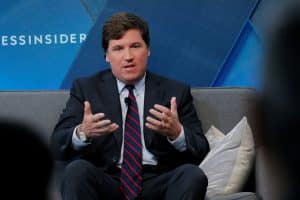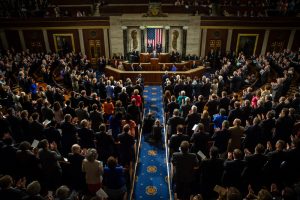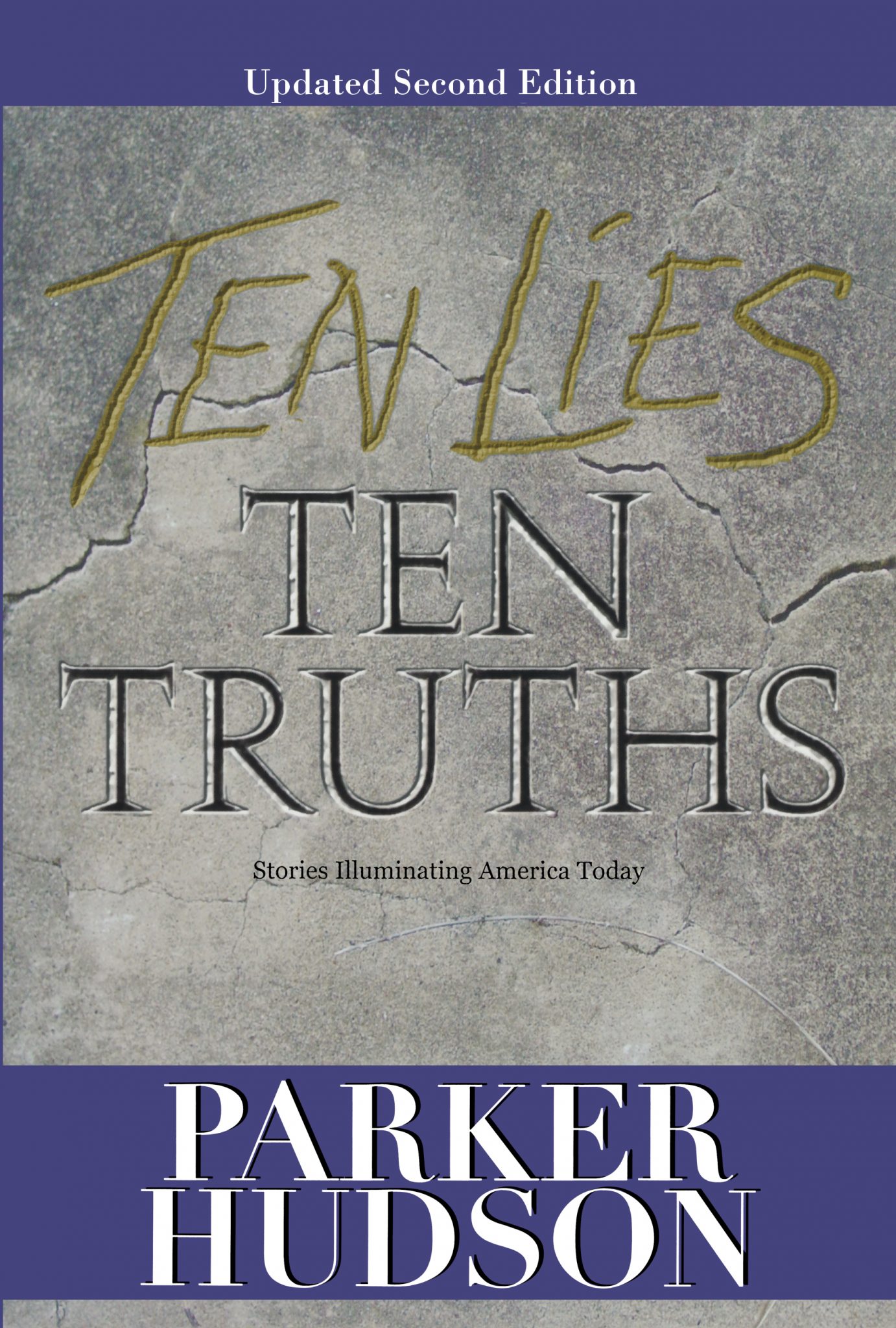To start the New Year, Tucker Carlson led off his show on January 2nd with a fifteen minute monologue that sent other pundits of all political stripes scurrying to attack or to support him. If you missed the original show, you can see it here. It is well worth watching, whatever your policy leanings, for the stakes he puts in the ground on several subjects.
that sent other pundits of all political stripes scurrying to attack or to support him. If you missed the original show, you can see it here. It is well worth watching, whatever your policy leanings, for the stakes he puts in the ground on several subjects.
I then read critiques of Carlson by David French, Conor Friedersdor, Ross Douthat , Jim Geraghty, Kevin Williamson, Jane Coaston and Adam Kotsko. All of them make some excellent points.
If forced to choose, I would come down closest to French and Geraghty, though I don’t agree totally with either of them. Then I watched Carlson’s original monologue again and took notes.
After all that, I am struck by what you might call a “glass half full” positive conclusion: All of these pundits are forcefully defending the American family, which has been my mission for decades! They come at  their reasons for the family’s demise and their recommendations for improvement from different directions, but I am genuinely encouraged that they still see the family as the basic building block of our society, and that they want to nurture and strengthen it.
their reasons for the family’s demise and their recommendations for improvement from different directions, but I am genuinely encouraged that they still see the family as the basic building block of our society, and that they want to nurture and strengthen it.
As a believer, I imagine that the forces of Evil rejoice whenever a family is ruptured by infidelity, strife, economics, alcohol, or drugs. Or when a family that should exist is not created. It is much easier for them to take out an individual than to decimate a coherent “squad” in a family with a true servant leader. Thus the importance of families to the family’s members, as well as to the nation and to the larger spiritual battle.
Carlson says, “Any economic system that weakens and destroys families is not worth having. A system like that is the enemy of a healthy society,” and he ends with “If you want to put America first, you’ve got to put families first.”
 French writes from the right, “We should reverse cultural messages that for too long have denigrated the fundamental place of marriage in public life.” And “the fundamental building block of any family is still your love, your discipline, and your fidelity.”
French writes from the right, “We should reverse cultural messages that for too long have denigrated the fundamental place of marriage in public life.” And “the fundamental building block of any family is still your love, your discipline, and your fidelity.”
From the left, Kotsko notices that “Carlson might be a conservative who is at last conceding that a lack of economic opportunities would do damage to family structures and life prospects in any community, black or white.”
Before tackling the main points here, let me say that Carlson seems to indulge in at least two bits of extreme hyperbole on marijuana legalization and manufacturing employment—subjects which earn him a lot of critical ink and actually rival the “factual” statements of some freshman Congresspeople, which is unfortunate for all concerned.
Anyway, I want to focus on the two big topics of his talk: Families, and Populism.
Families. If we start from the proposition that defending and improving the family is one of the best, most natural, and least costly ways to wind up “getting young people into the world prepared to make the right choices” (Geraghty), and to create inter-generational income and wealth, then Carlson and French/Geraghty are helpfully focused on two related but separate fronts in the battle: Institutional Influence and Individual Choices.
In his piece Carlson is focusing on the role of governments/the elite/the market, i.e., outside forces, in creating conditions in which it is much harder for families to thrive, either through their actions or their lack of action.
I believe the examples he gives, and many others, are generally legitimate. How long a list can we make?  Federally mandated housing segregation (see my previous post). Federal regulations’ failure with the opioid crisis. Three strikes and you’re out mandated over-incarceration. Forced busing to reduce school segregation which actually created increased segregation. The War on Drugs creating more crime than it will ever stop (see my November post). The War on Poverty with “ineffective charitable programs and destructive welfare policies” (French). Churches that do not welcome everyone. Business laws and practices that discourage early family formation (Douthat). Tax laws enacted by a paid Congress to enrich those who pay, and don’t sufficiently encourage family formation over corporate profits. And on and on.
Federally mandated housing segregation (see my previous post). Federal regulations’ failure with the opioid crisis. Three strikes and you’re out mandated over-incarceration. Forced busing to reduce school segregation which actually created increased segregation. The War on Drugs creating more crime than it will ever stop (see my November post). The War on Poverty with “ineffective charitable programs and destructive welfare policies” (French). Churches that do not welcome everyone. Business laws and practices that discourage early family formation (Douthat). Tax laws enacted by a paid Congress to enrich those who pay, and don’t sufficiently encourage family formation over corporate profits. And on and on.
 As I have said, before we turn over the solution for any problem to the federal government, we better be sure that there are no other remotely viable alternatives, and we better monitor continuously for unintended consequences. And mandatory sunset provisions would be helpful, because power always eventually corrupts.
As I have said, before we turn over the solution for any problem to the federal government, we better be sure that there are no other remotely viable alternatives, and we better monitor continuously for unintended consequences. And mandatory sunset provisions would be helpful, because power always eventually corrupts.
Anyway, French/Geraghty push back against Carlson by pointing out that much of what’s wrong with American families is due to the consequences of individual choices which are powerfully influenced by “a series of tectonic cultural changes—civil rights, women’s rights, a technological revolution as significant as the industrial revolution, the mass-scale loss of religious faith, the sexual revolution, etc.” (French), not forced on us by governments/the elite/the market, as Carlson suggests.
To them, “the primary responsibility for creating a life of virtue and purpose rests with families and individuals… We must not create a victim class of angry citizens. We must not tell them falsehoods about the power of governments or banks or elites over their personal destinies. We must not make them feel helpless when they are not helpless.” (French)
We must not create a victim class of angry citizens. We must not tell them falsehoods about the power of governments or banks or elites over their personal destinies. We must not make them feel helpless when they are not helpless.” (French)
While I certainly agree in general with them on the key role of individual responsibility and choices in creating positive outcomes, I think they are looking through rose colored glasses when dealing with a situation where one or more of the major forces mentioned above is aligned against you. A family of color could not choose to live in a neighborhood which had been redlined by a government housing appraiser. A petty thief sent off to many years at a prison for hardened criminals can still choose to make it when he returns, but it will be much, much harder. A husband whose family will be paid more if he leaves will be tempted to move out when times are tough. A young married woman, seeing the difficulty young mothers in her office have of returning to work so quickly after childbirth, will decide to put off starting her own family. A wage earner who has to pay taxes for bloated national interest debt, others’ entitlements, those who pay no taxes, and a huge federal bureaucracy, has less money to spend on her or his family. So, yes, individual choices are the most important, but I think Carlson is also right that there are some government/elite/market impediments to our choices which are real barriers, not just “speedbumps,” as French maintains.
So it seems in my “glass half-full” analogy that both approaches are right: for the sake of our nation and the family we need to emphasize at an early age the key responsibility of individual decisions for creating positive outcomes (French/Geraghty), while also actively reducing how governments and institutions can destroy or reduce the range of choices we can make because of laws, taxes and regulations which undermine the foundational role of the family (Carlson).
 Populism. Moving to the second major theme of Carlson’s monologue, populism, much of the critique centered on whether he is espousing a new “populism of the right.” And is it different from the “populism of the left” of Sanders, Warren and now many others?
Populism. Moving to the second major theme of Carlson’s monologue, populism, much of the critique centered on whether he is espousing a new “populism of the right.” And is it different from the “populism of the left” of Sanders, Warren and now many others?
Kotsko rightly points out that Carlson is not a wild-eyed radical populist hoping that the workers of the world are uniting. He states that Carlson believes that “some version of capitalism can still deliver an idealized America.” Kotsko takes a racial approach to his critique, missing an opportunity to congratulate Carlson for realizing that the decimated black family is the canary in the coal mine for government policies on families, and instead criticizing him for being late to realize that “when black communities are collapsing, the right is happy to use victim-blaming rhetoric to justify ignoring the problem [I disagree with this part of his statement; I (and I think Carlson) blame the government, not black families]—or even making it worse through mass incarceration. When something similar happens to white communities, the same conditions are an emergency demanding state action.”
In Carlson’s follow-up interview with Jane Coastan, she defines populism as a “rhetorical approach that separates ‘the people’ from elites.” It is clear that although Carlson is encouraging us to question and to oppose policies of the ruling class and the government elites, as he calls them, he is a supporter of populism only as a safety valve to prevent a move to much more destructive socialism.
Coastan quotes Carlson: “I think populism is potentially really disruptive. What I’m saying is that populism is a symptom of something being wrong,” he told me. “Again, populism is a smoke alarm; do not ignore it.”
I agree with Carlson here. Populism is a great “feeling”–I often am tempted to embrace it. But as Ari  Fleischer, President Bush’s Press Secretary, stated recently, the big problem with populism and other similar global movements, like Brexit, is that its supporters know exactly what they don’t want, but they don’t know what they do want and are therefore not prepared to govern if given the chance.
Fleischer, President Bush’s Press Secretary, stated recently, the big problem with populism and other similar global movements, like Brexit, is that its supporters know exactly what they don’t want, but they don’t know what they do want and are therefore not prepared to govern if given the chance.
I actually have at least one positive suggestion in the populist-governance area, but I’ll save it until next month. Meanwhile, do you have any concrete policy recommendations for conservatives or populists who find themselves in power? If so, please share them in a Comment.
So, thank you, Tucker Carlson and all the others, for launching 2019 with a lot of thoughtful policy discussion about families and populism. What a positive result it will be if one of the first questions we ask about any future policy is “What will be its effect on American families?”
___________________________
What I’m Working On
On the writing side of my life, I’m adapting my first novel, On The Edge, to both a movie and a TV series pilot. It’s interesting how the three forms of creative writing are related, but only as distant cousins. Very different approaches are required to utilize the real power of each vehicle. Thank you, Ted Baehr of Movieguide, and many others, for encouraging me years ago to tackle these genres.
And I’m writing a fourth novel, an On The Edge meets The President mix: a geo-political thriller with demons and angels. Because I want to be true to His Word, I have investigated and studied many Biblical references to spiritual beings, and the results have been quite fascinating. I hope to share some of my conclusions with you in later posts.
I hope to attend the (last!) Smarter Artist Summit in Austin in February with the crazily creative Story Studio team, and perhaps the NRB Convention in March.
If you have any comments on previous books or posts, or ideas for writing, please send them to parker@parkerhudson.com. I hope to see you next month. All the best.


Comments